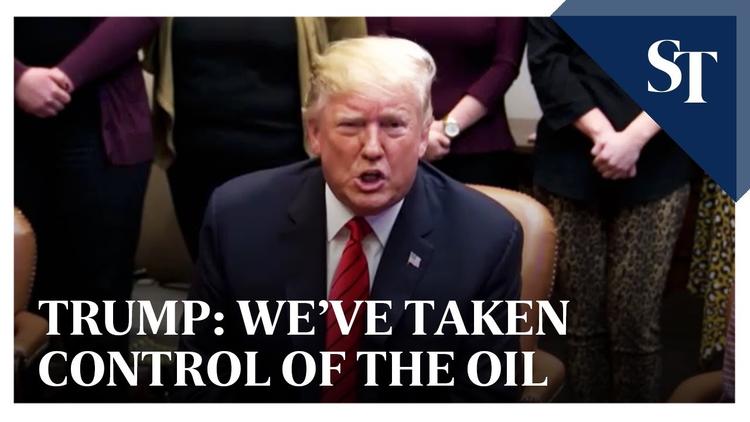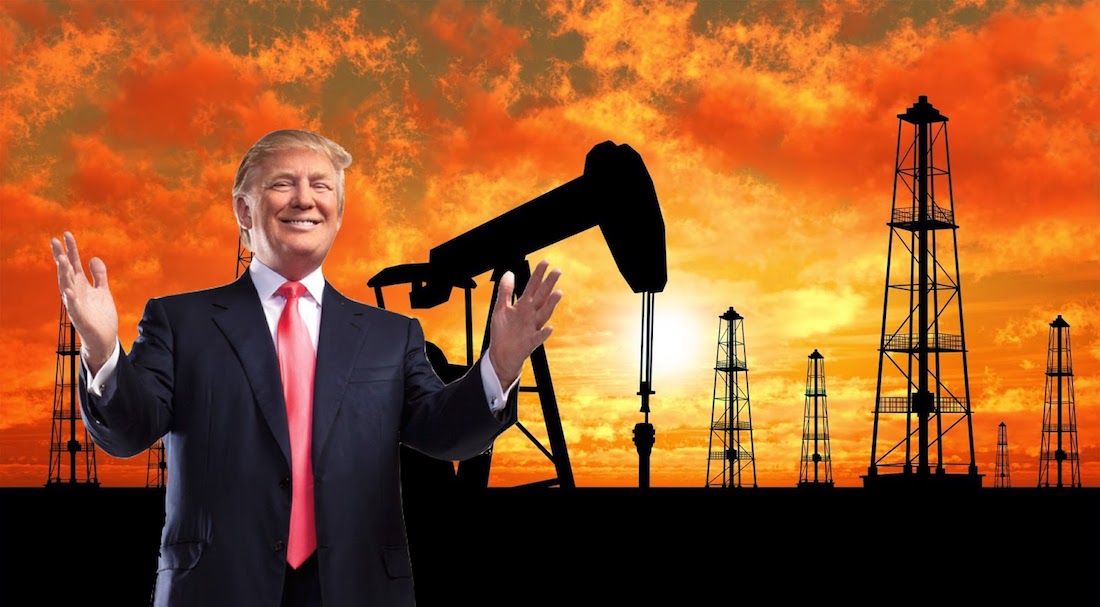
Trump Wants Deal With Exxon or Other Company to Take Syrian Oil: ‘We Should Be Able to Take Some.’
October 27, 2019) — Having sent growing numbers of troops into eastern Syria explicitly to control the oil, President Trump now says he is seeking a deal with Exxon Mobil or “one of our great companies” to go into occupied Syria and take the oil.
Trump has long suggested that in his view, the US should be able to just take oil from countries it is involved in militarily, as a way to recover some of the costs of his various wars. Trump said on Sunday that the oil is valuable and “we should be able to take some also.”
That Trump is sold on this idea is one thing, but convincing a US Oil and Gas Major to go along with the operation is another thing. The legal basis, particularly internationally, of taking Syrian oil without Syrian permission, and keeping US military forces there to keep Syria from stopping them, is going to be complicated, to say the least.
Trump’s conviction that legally it’s probably fine, after all, doesn’t mean the US company, whichever it turns out to be, wouldn’t get sued in the US or internationally for looting Syria’s oil.
These huge multinational companies are notoriously risk-averse about conflict, and would likely be so about joining the president in an oil-taking scheme of this sort. That means while Trump continues to war to keep the oil, he’s going to face a big job selling the idea to any company.

Convoys of US troops enter from Iraq, to reinforce oilfields
US Boosts Troop Numbers in East Syria to Control Oil
(October 27, 2019) — With several hundred US troops already planned to stay in Syria to “control the oil,” US convoys are sending more troops into Syria Deir Ezzor Province from neighboring Iraq, and reinforcing the areas around the oilfields.
Exactly how many troops are there, or how many were sent is not known. President Trump previously classified troop levels in Syria, saying the enemy “must never know” of American plans. It’s not clear who the enemy is at this point, since the war’s goal is now controlling the oil.
But President Trump has indicated repeatedly that he intends to not just retain control over Syria’s oil, and that he believes the US deserves to take some oil for itself out of Syria’s fields.
With Trump escalating talk about taking the oil, it’s clear the US military is being charged with escalating its presence at the oil to preclude anyone from contesting America’s claim to the oil.

Trump Wants to Make a Deal with Exxon or Others to Tap Syrian Oil: ‘We Should Be Able to Take Some’
(October 27, 2019) — President Donald Trump on Sunday said he’s interested in making a deal with ExxonMobil or another energy company to tap Syrian oil reserves.
“What I intend to do, perhaps, is make a deal with an ExxonMobil or one of our great companies to go in there and do it properly . . . and spread out the wealth,” he said.
President Trump has identified Syria’s oil as a US national security priority and has committed to deploying troops to protect the country’s reserves even as he pulls troops from Syria’s northern regions. US Defense Secretary Mark Esper said this week that the US will send in troops to protect Syrian oil fields from Islamic State militants.
Trump has faced heated criticism from both Republicans and Democrats, who have accused the president of abandoning an American ally by pulling troops from the Syrian-Turkish border region. The withdrawal cleared the way for a Turkish military operation against the Kurds, US allies in the fight against the so-called Islamic State, or ISIS.
“The oil is so valuable, for many reasons,” Trump said on Sunday. “It fueled ISIS, number one. Number two, it helps the Kurds — because it’s basically been taken away from the Kurds . . . And, number three, it can help us, because we should be able to take some also.”
Trump made the comments while announcing the death of Islamic State leader Abu Bakr al-Baghdad following a US military raid in Syria.
In a press conference that followed, US Senator Lindsey Graham of South Carolina supported President Trump’s focus on Syrian oil, when a reporter asked by what “legal right in international law” the US could take Syrian oil.
“This was the chief source of revenue for a long time for ISIS,” Graham said. “It is now in the hands of Syrian Democratic Forces, which are Arabic Kurds, mostly Kurds, with the partnership with the United States. So, no this doesn’t violate any law. In my view, what it does is just good common sense foreign policy.”
“This is a win-win,” he continued. “The SDF will get more money if we can modernize the oil fields.”
President Trump’s former secretary of State, Rex Tillerson, was chairman and CEO of Exxon. The company is currently battling a law-suit that accuses it of misleading investors about the risks of climate change regulations to its business.
Shares of Exxon are up 1.5% through the year, giving it a market capitalization of $293 billion.

Trump Suggestion of Taking Syrian Oil Draws Rebukes
Lawrence Delevingne / International Business Times
“What Washington is currently doing — seizing and placing under control the oilfields of eastern Syria — is simply international banditry” — Russian Defense Ministry Statement
NEW YORK (October 28, 2019) — US President Donald Trump’s suggestion on Sunday that Exxon Mobil or another US oil company operate Syrian oil fields drew rebukes from legal and energy experts.
“What I intend to do, perhaps, is make a deal with an ExxonMobil or one of our great companies to go in there and do it properly . . . and spread out the wealth,” Mr Trump said during a news conference about the US special forces operation that led to the death of Islamic State leader Abu Bakr al-Baghdadi.
Exxon Mobil Corp and Chevron Corp, the two largest US oil companies operating in the Middle East, declined to comment on his remarks.
“International law seeks to protect against exactly this sort of exploitation,” said Laurie Blank, an Emory Law School professor and director of its Center for International and Comparative Law.
“It is not only a dubious legal move, it sends a message to the whole region and the world that America wants to steal the oil,” said Bruce Riedel, a former national security advisor and now senior fellow at the Brookings Institution think-tank.
“The idea that the United States would ‘keep the oil’ in the hands of ExxonMobil or some other US company is immoral and possibly illegal,” said Jeff Colgan, an associate professor of political science and international studies at Brown University. Colgan also said US companies would face “a host of practical challenges” to operate in Syria.
Even getting Exxon or another major oil company to develop Syrian oil would be a “hard sell” given its relatively limited infrastructure and small output, said Ellen R. Wald, a senior fellow at the Atlantic Council’s Global Energy Center.
Syria produced around 380,000 barrels of oil per day before the country’s civil war erupted. An International Monetary Fund working paper in 2016 estimated that production had declined to just 40,000 barrels per day.
Still, the United States should be concerned about the fate of the Syrian oil fields, said Alex Cranberg, chairman of energy firm Aspect Holdings LLC, which has explored production in Iraqi Kurdistan but no longer has active projects in the region.
“It’s not that the oil itself matters much to the US, but that its misuse could fund future problems for us” if it falls into the wrong hands, Cranberg said, noting his company has not been approached by the White House.
“US control over the disposition of the fields and the hard currency they offer would provide a significant influence over the shape of Syria’s future,” he said.
Robert O’Brien, a US National Security advisor to the president, said a US military presence will be required to protect the Syrian oilfields, suggesting it also should have a say on their proceeds.
“We’re going to be there for a period of time to maintain control of those and make sure that there is not a resurgence of ISIS and make sure that the Kurds have some revenue from those oil fields,” Mr. O’Brien said, speaking to NBC News’ Meet the Press with Chuck Todd.

Trump Hands Oil & Gas to Syria & Russia As he Claims “We’ve Taken Control of the Oil in the Middle East”
ANN ARBOR (October 20, 2019) — Trump claimed that “we’ve taken control of the oil in the Middle East” as a result of his greenlight to Turkey to invade Syria.
As usual, no one could understand what he was talking about. Syria and Turkey are not oil states, though Syria was doing 400,000 barrels a day before the 2011 revolution. The world produces about 100 million barrels a day and big producers like Saudi Arabia, Russia and the US itself put out between 9 and 12 million barrels a day. Syria’s prewar production is more than matched by the fracked Bakken fields in North Dakota, which produce over a million barrels a day.*
So Trump has not actually taken control of any oil at all by letting Turkey into northeast Syria.
But there is a sense in which he has done the opposite. Likely one of the many goals of the US presence in northeast Syria was to prevent the Syrian regime from recovering the oil and gas fields there (and most such Syrian fields are in the northeast). The ISIL “caliphate” had taken many of these facilities in 2014 and used to sell crude to the Syrian regime and smuggle it to Turkey, as a source of income.
And then the US bombed many of the oil and gas facilities as the Kurdish People’s Protection Units (YPG) took them back away from ISIL. Most of them were probably too damaged to provide much income to the Kurds subsequently, but perhaps some of them did.
“We took the oil. We’ve got to keep the oil.” — Mouaz Moustafa, Syrian opposition leader
Although 400k barrels a day is a drop in the bucket in world oil market terms, given that the Syrian regime of Bashar al-Assad is an economic basket case, getting back those oil and gas fields would be, over time, a godsend. Or in this case Trumpsend.
The Kurds have thrown in the towel and invited Bashar al-Assad’s Syrian Arab Army and its Russian ally back into the northeast, which has 90% of Syria’s oil and 45% of its natural gas.
The Russian channel Sputnik reports in Arabic that a Syrian government spokesman has announced that all the oil and gas fields of Homs, Hama and Raqqa are now in the hands of the Syrian government again and that investments are being made to bring them back online. It will take a lot of work to do so, given extensive war damage.
The Syrian Arab Army and Russian troops entered Raqqa, the former ISIL capital, just a few days ago, after the Kurdish YPG withdrew to concentrate on defending its northern lines against Turkey. Despite the resurgence of some slight ISIL terrorism activity in eastern Syria, the Damascus regime seems eager to reassert itself there, especially given the likelihood of recovering oil and gas fields.
The Russian press is speculating that Russian companies will be the ones to develop and benefit from these recovered fields. A Russian government spokesperson said Friday that Moscow is completely confused by US aims in Syria. I guess so. They can’t figure out why Trump gave them and Assad this gift of recovered oil fields, which could eventually strengthen the Damascus regime.
Posted in accordance with Title 17, Section 107, US Code, for noncommercial, educational purposes.